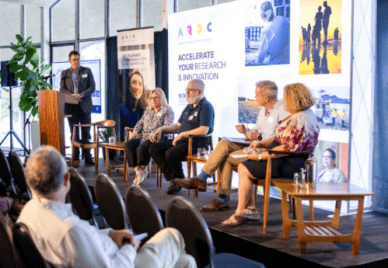
Data and Platforms: Meeting Australia’s Future Research Needs
Exploreabout Data and Platforms: Meeting Australia’s Future Research Needs
Important: the co-design workshop has 2 parts, and we hope you can participate in both sessions – you will need to register for each separately.
Register for Workshop 1 – 2-4pm Wed 10 April (AEST), online and in Canberra, in partnership with the Academy of Social Sciences in Australia.
Register for Workshop 2 – 2-4pm Tues 23 April (AEST), online.
The Australian Research Data Commons (ARDC) invites the research community to join 2 workshops to co-design a new national research infrastructure project that will support social science researchers.
The new program is part of the ARDC’s HASS and Indigenous Research Data Commons, which is establishing long-term, enduring national digital research infrastructure to support researchers to harness research data to enhance Australian social and cultural wellbeing, and help understand and preserve our culture, history and heritage.
Last year, the HASS and Indigenous Research Data Commons was awarded $25 million from the Australian Government’s 2023 National Collaborative Research Infrastructure Strategy (NCRIS) Funding Round, which is in addition to the $8.9 million received from NCRIS to establish the HASS and Indigenous RDC, which was launched in 2021.
The new funding from the Australian Government will be invested through the ARDC’s co-design and co-investment approach to building digital research infrastructure.
In this workshop, we seek input from the HASS and Indigenous research community to co-design the programs and projects that will meet the digital infrastructure needs of researchers now and in the future.
The HASS and Indigenous Research Data Commons is committed to enabling capable people, effective institutions, innovative technology, relevant data and collaborative governance with the aim of elevating research capability in the HASS and Indigenous research sectors.
The program of work for social sciences will aim to bolster the research infrastructure that enables identifying, analysing and providing solutions for the grand societal and economic challenges facing Australia. It will seek to facilitate more seamless collaborative research while elucidating the underlying factors that have influenced trends and divisions within Australian social science practice.
Building upon established research communities enabled by previous investments, this program will foster a cohesive national approach to managing Australian social science-related data, platforms and services. Through enhanced documentation, harmonisation and dissemination of data, platforms and services, it promises to significantly enhance research capabilities for academics, practitioners, government bodies, and the wider public.
We seek to develop infrastructure that creates the greatest impact for research and researchers by co-designing that infrastructure with the people who will benefit from it. Co-design will involve a wide range of stakeholders with different experience and expertise. Our aim is to include all the perspectives necessary to allow a consideration of specific researcher needs, balanced by relative needs and priorities, and what is practically possible to address.
We will be holding 2 open co-design workshops to better understand the current challenges around accessing, using and analysing social science data. We will discuss the investment opportunity that ARDC has identified, with the aim of learning:
Workshop participants are expected to actively participate in discussions. We encourage participants to attend both workshops if possible. A summary of the discussions will be made available after each workshop.
The process we will follow is described in the HASS and Indigenous Research Data Commons Co-Design Framework, and is based on established methods such as the TACSI Co-Design Framework. Development of our co-investment activities will follow these steps:
The Problem Identification and Project Shaping phases will be conducted through open co-design workshops. We will seek community feedback on the draft project plan, and the final plan will be reviewed by the HASS and Indigenous Research Data Commons Advisory Panel prior to endorsement.
The planned work will be delivered as a contracted co-investment activity. The ARDC will enter into a single 4-year contract with the lead organisation, who will sub-contract external partner organisations on the project team as required.
The sessions will not be recorded. If you are unable to join there will be opportunities to contribute to shaping the program outside the workshops.
Email [email protected]
To keep up-to-date on latest digital research news and events, subscribe to the ARDC Connect newsletter.
Please note that this event may be recorded and published by the ARDC. This may include your contributions during the session. Attendees are expected to abide by the ARDC Code of Conduct during this event. ARDC respects the privacy of individuals. Information collected is in accordance with the ARDC Privacy Policy.